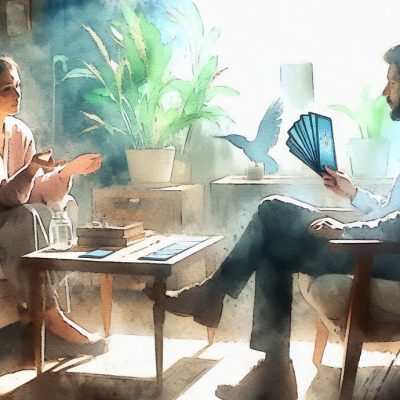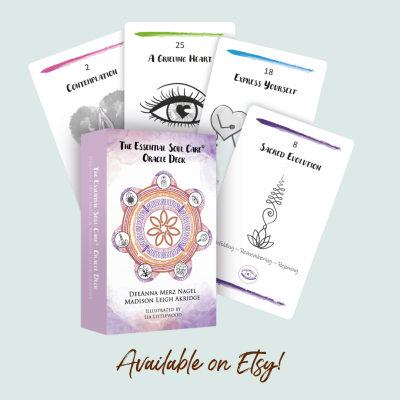 Yes, Oracle cards can be integrated into clinical supervision with psychotherapists, offering a creative, reflective, and symbolic approach to exploring clinical dynamics, professional development, and the supervisory relationship. While not a conventional method in clinical supervision, Oracle cards can serve as a tool for enhancing self-awareness, fostering insight, and stimulating discussion in various areas relevant to supervision. Here are several ways Oracle cards can be effectively integrated into case consultation and/or clinical supervision as projective tool that promotes insight and elicits active imagination:
Yes, Oracle cards can be integrated into clinical supervision with psychotherapists, offering a creative, reflective, and symbolic approach to exploring clinical dynamics, professional development, and the supervisory relationship. While not a conventional method in clinical supervision, Oracle cards can serve as a tool for enhancing self-awareness, fostering insight, and stimulating discussion in various areas relevant to supervision. Here are several ways Oracle cards can be effectively integrated into case consultation and/or clinical supervision as projective tool that promotes insight and elicits active imagination:
Enhancing Reflective Practice
- Purpose in Supervision: Clinical supervision often involves reflecting on the therapist’s work with clients, including challenges, successes, and the therapist’s emotional responses (countertransference).
- Role of the Oracle Card: Oracle cards can be used to stimulate reflection on a particular case or therapeutic dynamic. A supervisee might choose a card that symbolizes their emotional experience or their perception of a client’s struggles. This opens up space for deeper exploration of the therapist’s feelings and reactions, encouraging them to reflect on unconscious material or emotional triggers that might be affecting their work.
Exploring Countertransference and Transference
- Purpose in Supervision: Supervision often addresses countertransference (the therapist’s emotional responses to a client) and transference (the client’s emotional responses to the therapist). Understanding these dynamics is essential for effective therapy.
- Role of the Oracle Card: Oracle cards can help the therapist identify and explore unconscious feelings or reactions they may have toward a client. For example, if a supervisee is struggling with a particular client dynamic, they might draw a card that reflects their internal experience or the nature of the relationship. This can provide a symbolic way of accessing deeper feelings or reactions that may be difficult to articulate otherwise.
Facilitating Creative Problem-Solving
- Purpose in Supervision: Supervisors and supervisees often work together to find creative solutions to challenges in therapy, such as impasses in the therapeutic process or difficulties in establishing rapport with clients.
- Role of the Oracle Card: Using Oracle cards can inspire new ways of thinking about difficult clinical situations. For instance, the supervisee might draw a card that offers a fresh perspective on the issue, symbolizing a new approach or highlighting an aspect of the problem that hadn’t been considered. This can encourage therapists to think outside of the traditional cognitive frameworks and engage with their intuition and creativity.
Self-Care and Professional Growth
- Purpose in Supervision: Supervisors often emphasize the importance of self-care and personal development for therapists, particularly given the emotional toll of therapeutic work.
- Role of the Oracle Card: Oracle cards can help supervisees explore their own needs for self-care or professional growth. Drawing a card might prompt discussion about areas where the therapist feels depleted, unsupported, or in need of rejuvenation. The symbolism in the card could also reveal underlying concerns about burnout or professional identity, allowing the supervisor and supervisee to address these issues in a meaningful way.
Strengthening the Supervisory Relationship
- Purpose in Supervision: The relationship between the supervisor and supervisee is key to effective supervision, providing a foundation of trust, support, and mutual respect.
- Role of the Oracle Card: Oracle cards can be used to explore the dynamics of the supervisory relationship itself. A supervisee might draw a card that reflects how they feel about the supervision process or the support they are receiving. This can open up conversations about trust, boundaries, communication, or other aspects of the relationship that are important for both professional and personal growth.
Accessing Unconscious Material
- Purpose in Supervision: Like in therapy, clinical supervision often involves exploring the therapist’s unconscious material, such as biases, blind spots, or unresolved personal issues that might affect their clinical work.
- Role of the Oracle Card: Oracle cards can act as mirrors for unconscious thoughts and feelings. By drawing a card, the supervisee can access deeper layers of their psyche that may not come up in traditional supervisory discussions. The imagery on the card might evoke memories, emotions, or themes that the supervisee hadn’t consciously recognized, providing valuable material for exploration.
Addressing Ethical Dilemmas
- Purpose in Supervision: Clinical supervision is also a space where ethical dilemmas are discussed, helping therapists navigate complex situations in their work with clients.
- Role of the Oracle Card: When facing an ethical dilemma, Oracle cards can serve as a tool for deeper reflection. The supervisee might draw a card that symbolizes the tension they are experiencing or a potential solution. This can lead to a more nuanced conversation about the ethical issues at play, guiding the supervisee to consider different perspectives or principles in their decision-making.
This list is not exhaustive. I use Oracle cards in clinical supervision and in therapeutic consultation with individuals. Mostly I use the deck I co-created as it was created with license and scope of practice in mind. If you are interested in pursuing 1:1 reflective mentoring and consultation, consider my 12-month intensive. See details below.
12-Month Intensive
Psychospiritual Intensive for Therapists, Coaches and Healers





